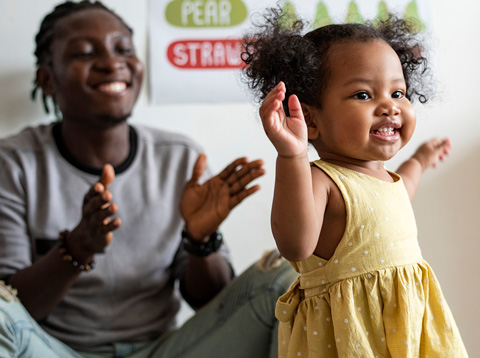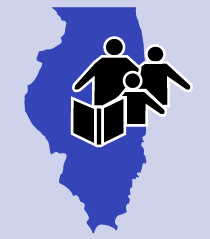
Staying Active During Winter
Does winter give you “the blues”? Are you less active in the winter than during warmer months? If so, we have some ideas to help you and your child stay active during the cold winter months.
Finding opportunities for physical movement during winter in Illinois can be difficult, but there are many benefits to staying active for both you and your child. Movement keeps adults healthy, both body and mind. The same is true for children. Movement activities can help children strengthen their relationship with you, develop strength and coordination, gain independence, and build confidence.
Bundle Up and Go for a Walk
The more technology we use, such as iPads, phones, and TVs, the more we need nature! Whether you live in a city or on several acres of land, nature is everywhere. When the weather allows, bundle up your little one and go outside for a walk together in your neighborhood, to the park, or at a nature preserve.
There are so many things to talk about and experience, such as how the wind feels on your face, the sounds of the passing cars or barking dogs, the feeling of walking on the hard pavement and the uneven ground, and how the snow feels and looks falling from the sky.
This is a great way for you and your child to exercise, take in the sensory experiences nature has to offer, and spend time together. Plus, being in nature can improve well-being!
If it is too cold to go outside, stay inside and move!
Have a Dance Party
Turn up your favorite tunes and have a dance party with your kiddo! Dancing is a great activity for your heart, coordination, and balance, and it can improve mood. Plus it is fun! First see how your child moves their body on their own to the music, then imitate their movements, sounds, and/or words.
See how many times you can copy each other! Did you know that imitating each other is an important skill for developing language? You can also pick up your child, hold them closely, and dance together. Sing along, clap your hands, and move your body to match the song, moving fast and slowly. Be silly and laugh together; laughter can help relieve stress and burn calories!
Pretend and Move Together
When sharing books or playing together, use your imagination and pretend to move like the objects you see in books or like your toddler’s toys. For example, trot like a horse, stretch out like a starfish, waddle like a duck, jump like a kangaroo, zoom around the room like a race car, or roll like a cement mixer.
Pretend play helps to develop empathy because your child is “putting themselves in someone else’s shoes” by acting like others. And, when your child pretends and moves, they are practicing taking turns, developing their understanding of words, using their imaginations, strengthening their muscles, and balancing and coordinating their bodies! Plus, you’re moving and exercising without having to go to the gym!
Talk with your EI team about how you can individualize these activities for your child. This winter, try to move with your child indoors or outdoors every day, even for just a few minutes at a time. It adds up over the course of the day!
EI and Transition in the Time of COVID-19
Do you have questions about early intervention during COVID-19? Is your child transitioning to school services during the pandemic? In a one-hour webinar sponsored by Family Matters, a Parent Training and Information Center in Illinois, and the Early Intervention Clearinghouse, you can learn much about both early intervention and the transition to school services.
Regarding early intervention, the webinar may answer your questions such as:
- During COVID-19, what are my options to receive early intervention services? How do I decide the best way to receive services for my family?
- What should I expect of live video visits? What technology do I need for live video visits?
- What should I expect during in-person visits?
- Who should I contact if I have concerns about early intervention?
Regarding the transition to school services, the webinar answers such questions as
- Does my child have to transition at age 3 into the school system?
- Is my child entitled to receive a free, appropriate public education?
- Is my child entitled to an evaluation upon turning 3 years old?
- What will school services look like for my child?
- Who should I contact if I have concerns about school services?
To watch the webinar, go to this link: https://www.fmptic.org/recordings/family-matters-recordings/4494
The Early Intervention Clearinghouse will continue to update its materials about early intervention services during COVID-19.
For more information about school services, visit the websites of Family Matters and the Family Resource Center on Disabilities:
- Information about early intervention services during COVID-19
https://eiclearinghouse.org/resources/trying-times/ - Information about school services during COVID-19
https://frcd.org/frcd-covid-19-information-page-frcd-is-here-to-help/
Learning at Home Activities for Infants and Toddlers
The llinois Early Learning Project has created a bank of learning at home activities. These simple activities take 15-30 minutes and can generally be done with items already found in your home or neighborhood. Here are couple of examples. Find more at https://illinoisearlylearning.org/resources/athome/
Family Update on EI During COVID-19
We hope you and your family continue to stay safe and healthy during COVID-19. At the Early Intervention Clearinghouse, we are providing updates about early intervention in Illinois during the pandemic.
In this update, we provide a summary of recent resources and guidance about early intervention.
You continue to have several options to receive early intervention services in Illinois, including in-person visits, live video visits, and phone consultations. Many families are opting for in-person visits or live video visits.
To this end, we provide several resources for each of these types of delivery.
In-person visits
For information about in-person visits during COVID-19, review the guidance from the Bureau of Early Intervention at http://www.wiu.edu/coehs/provider_connections/pdf/Early%20Intervention%20Updated%20Guidance%20for%20Limited%20In%20Person%20Services%20120920.pdf
Live video visits
If you need technology or devices to access live video visits, we are offering a loan program. Please visit https://eiclearinghouse.org/resources/techloan/
For videos about live video visits, including real families discussing their experiences with live video visits, go to https://eiclearinghouse.org/resources/trying-times/ and click on the “Videos for Parents on Live Video Visits” dropdown.
State Systemic Improvement Plan (SSIP) Update
We are continuing to focus on family engagement as a way to enhance families’ capacity to meet the developmental needs of their infants and toddlers. The leadership teams are supporting providers’ shift in service delivery and we are working on a tool to learn about how families are being supported. Live video visits and phone consultation have provided additional opportunities for using coaching strategies. Though activities look a little different right now, we are hopeful that the strategies we are using are supporting families during these challenging times!
Related Resource(s)
- Tip Sheets: Everyday Early Intervention: Indoor Fun

